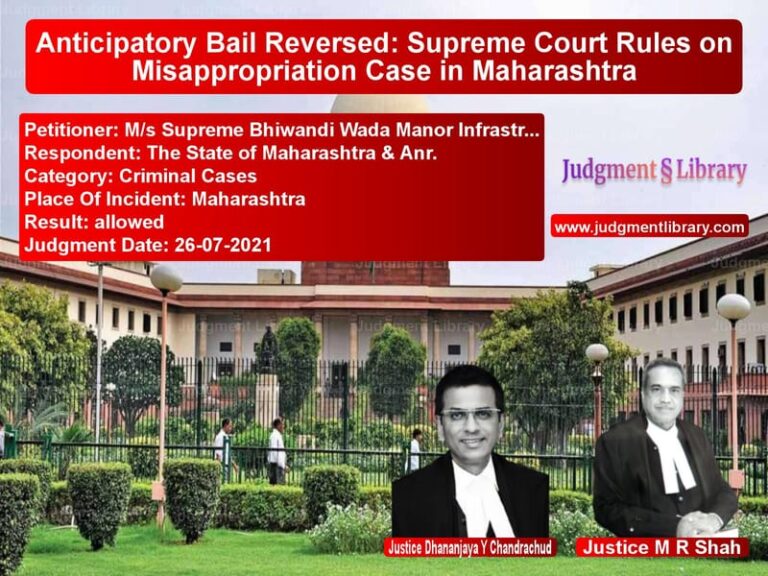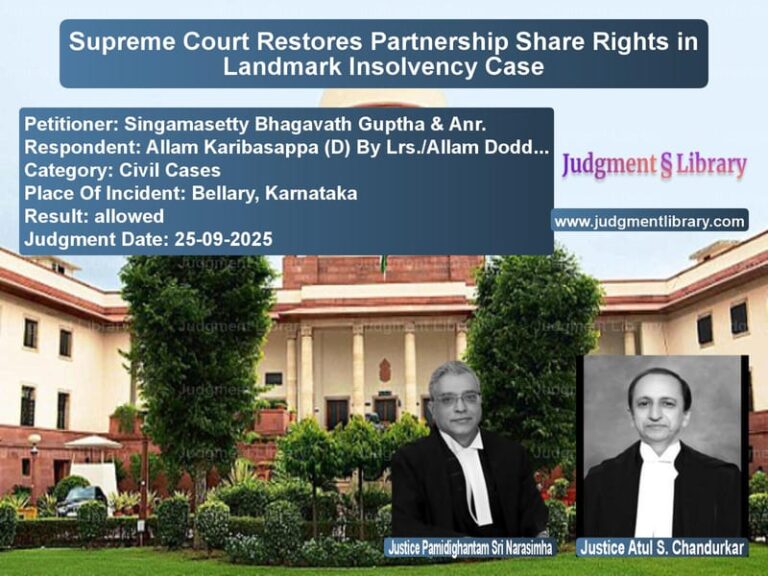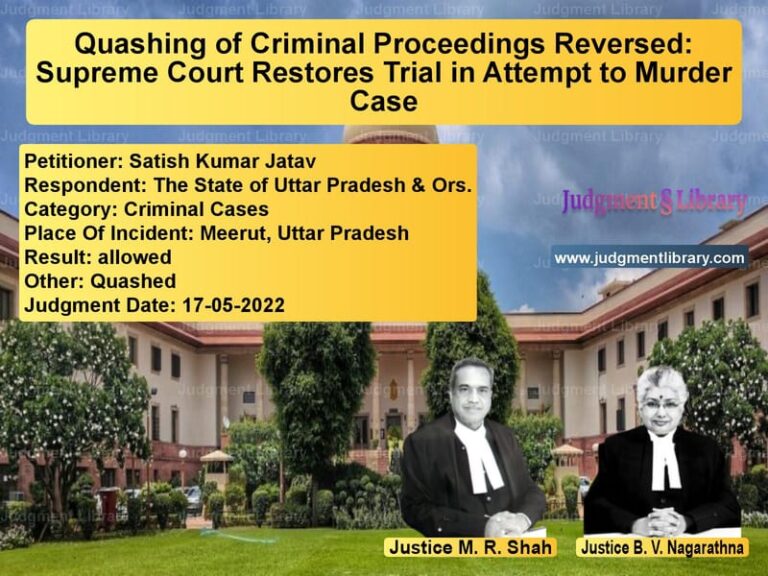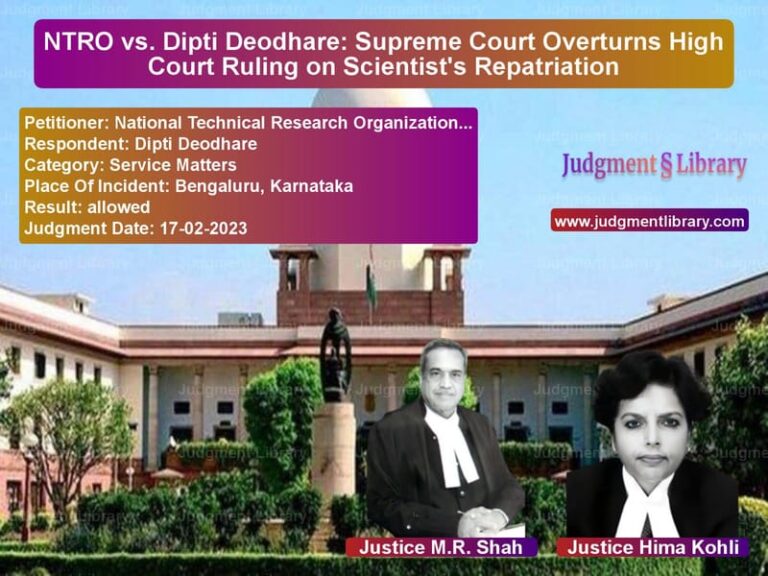Environmental Compensation in Delhi: Supreme Court’s Ruling on Sewerage Charges
The case of Tata Power Delhi Distribution Ltd. vs. Manoj Misra & Others revolves around a dispute concerning the collection of environmental compensation in Delhi. The Supreme Court was tasked with deciding whether electricity distribution companies could be directed to collect environmental compensation from consumers as part of their electricity bills. The case has significant implications for pollution control, urban development, and the principle of ‘polluter pays.’
Background of the Case
The case originated from a petition filed under Sections 14 and 15 of the National Green Tribunal (NGT) Act, 2010. The petitioner, Manoj Misra, raised concerns about:
- Encroachment and dumping of debris in the Yamuna riverbed.
- Pollution caused by unauthorized colonies contributing sewage waste.
- The impact of urban expansion on Delhi’s water bodies, including the Kushak drain and Shahdara Link Drain.
The NGT formed expert committees that submitted reports on pollution levels in the Yamuna and the role of untreated sewage. Based on the reports, the NGT issued multiple directives, including a phased action plan to clean the river.
NGT’s Key Directives
The NGT’s order on January 13, 2015, included directives requiring:
- The implementation of a sewage treatment plan costing ₹3,659 crores.
- The financing of the project through various government agencies, including the Delhi Jal Board and Ministry of Urban Development.
- The imposition of an environmental compensation charge on every household in Delhi based on property tax or water bills.
- The collection of this charge through electricity bills.
Petitioner’s Arguments
The appellant, Tata Power Delhi Distribution Ltd., challenged the NGT’s directives, arguing:
- Electricity distribution companies should not be burdened with collecting environmental compensation.
- The cost of implementing the collection system would have to be passed on to consumers, contradicting the Electricity Act, 2003.
- Revenue generated from electricity bills should not be diverted for non-electricity-related activities.
- The Delhi Electricity Regulatory Commission (DERC) did not approve the collection of environmental compensation through electricity bills.
Respondents’ Arguments
The respondents, including Manoj Misra and the Delhi Government, defended the NGT’s directive:
- The ‘polluter pays’ principle justifies the imposition of environmental compensation.
- All residents of Delhi contribute to sewage pollution, whether they live in authorized or unauthorized colonies.
- Electricity distribution companies have a widespread collection network, making them suitable for collecting the charges.
- The funds would be used for essential infrastructure upgrades to combat water pollution.
Supreme Court’s Observations
The Supreme Court evaluated whether the NGT’s order was legally and procedurally sound. The Court noted:
“The directions of the Tribunal must align with statutory provisions. The principle of ‘polluter pays’ is applicable, but the method of collection must be in compliance with regulatory frameworks.”
Further observations included:
- The DERC’s objections were valid; electricity companies cannot be forced to collect unrelated charges.
- Environmental compensation should be collected through appropriate municipal agencies, not private electricity providers.
- The NGT’s 2015 directive was inconsistent with Delhi’s urban infrastructure policies.
Final Verdict
The Supreme Court ruled:
- The NGT’s 2015 directive requiring electricity companies to collect environmental compensation is quashed.
- The Delhi Government must implement an alternative collection mechanism for sewerage charges.
- The revised directive from September 11, 2019, which proposed a separate collection method, should be implemented within two months.
Legal and Policy Implications
This judgment has critical implications for environmental governance:
- Clarification of Regulatory Roles: The ruling defines the limits of the NGT’s power in directing private companies to collect government levies.
- Strengthening Environmental Funding: It underscores the need for a structured approach to financing pollution control measures.
- Reaffirmation of the Polluter Pays Principle: While the ruling rejected electricity-based collection, it reinforced the principle that residents must contribute to sewage treatment costs.
Conclusion
The Supreme Court’s ruling balances environmental responsibility with legal compliance. By quashing the directive for electricity companies to collect sewerage charges, the Court ensured that environmental policies do not conflict with regulatory frameworks. This judgment serves as an important precedent for future environmental financing initiatives.
Petitioner Name: Tata Power Delhi Distribution Ltd..Respondent Name: Manoj Misra & Others.Judgment By: Justice L. Nageswara Rao, Justice Hemant Gupta.Place Of Incident: Delhi, India.Judgment Date: 24-10-2019.
Don’t miss out on the full details! Download the complete judgment in PDF format below and gain valuable insights instantly!
Download Judgment: Tata Power Delhi Dis vs Manoj Misra & Others Supreme Court of India Judgment Dated 24-10-2019.pdf
Direct Downlaod Judgment: Direct downlaod this Judgment
See all petitions in Environmental Cases
See all petitions in Public Interest Litigation
See all petitions in Fundamental Rights
See all petitions in Judgment by L. Nageswara Rao
See all petitions in Judgment by Hemant Gupta
See all petitions in allowed
See all petitions in Quashed
See all petitions in supreme court of India judgments October 2019
See all petitions in 2019 judgments
See all posts in Environmental Cases Category
See all allowed petitions in Environmental Cases Category
See all Dismissed petitions in Environmental Cases Category
See all partially allowed petitions in Environmental Cases Category







